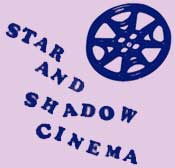Hyenas (SENEGAL)
Dir. Djibril Diop Mambety , Wolof, with English subtitles, 1992
-
Sun 13 September 2009 // 19:30
/ Cinema
"Djibril Diop Mambety's work is among the most enigmatic and imaginative in African cinema." - Filmreference.com
A beautiful parable of greed, power and insanity from one of the great masters of Africancinema.
THE PLOT
An African adaptation of Friedrich Durrenmatt's famous Swiss play, The Visit, Hyènes tells the story of an aging, wealthy woman who revisits her home village--and Mambéty's--of Colobane. She offers a disturbing proposition to the people of Colobane and lavishes luxuries upon them to persuade them.
This embittered woman, "as rich as the World Bank" will bestow upon the village a fortune in exchange for the murder of a local shopkeeper who abandoned her after a love affair, and her illegitimate pregnancy, when she was 16.
REVIEWS, AWARDS
"Diop Mambety shows an able hand in managing his talented cast and cuts quite a commanding figure himself when he appears in a pivotal small role." - The Chicago Reader
"Hyenas is awash in the hypnotic colours and intoxicating sounds of West Africa - a wicked comedy depicting the devastating effects of greed on a small, poverty-stricken village." - Africa in Motion, the Edinburgh African Film Festival
The film part of the official selection at the Cannes Film Festival.
THEMES
The intimate story of love and revenge between the main two characters parallels a critique of neocolonialism and African consumerism. Mambéty once said, "We have sold our souls too cheaply. We are done for if we have traded our souls for money" Although its characters are distinct, Mambéty considered Hyènes to be a further exploration of the themes of power and insanity.
WHAT THE DIRECTOR SAYS
From a great interview that you can read here
 HUMANKIND
HUMANKIND
"Everyone in Colobane [the village in which Hyenas is set] --everyone everywhere--lives within a system of power that embraces the West, Africa, and the land of the rising sun. There is a scene where this woman comes in and reads: she reads of the vanity of life, the vanity of vengeance; that is totally universal. My goal was to make a continental film, one that crosses boundaries.
The film depicts a human drama. My task was to identify the enemy of humankind: money, the International Monetary Fund, and the World Bank. I think my target is clear."
THE WORLDBANK
"Hyenas takes place in a poor city, amongst poor people and what I'm saying is : if you want money one of you will have to be killed. The World Bank and it's International Monetary Fund did the same with the poor South of the world. They tell the African people "we know that you're poor but you have too many peoples working and you don't have enough money to pay them so you have to kill some of them. Then we can give you money. You have to clean up your economy. kill enough people and we will give you money." [this is form another article here]
THE MARGINALISED
"I am interested in marginalized people, because I believe that they do more for the evolution of a community than the conformists. Marginalized people bring a community into contact with a wider world.
If we think of the old shopkeeper in Hyenas, we find that he, too, is marginalized, although he is a well-known character in the city of the village. But this aspect of his character allows me to investigate every aspect of his society. Perhaps a marginal person can give you an accurate vision of a society because he varies from its norms."
ON BEAUTY AND CINEMA
"While Hyenas tells a human story to the whole world, I also wanted to pay homage to the beauty of Africa when I made the film. For me, part of that beauty is the fact that it is not very difficult to make a film in Africa. The abandoned bags of rice that the people of Colobane wear at the end of the film did not cost much; it was only the equipment for the production that was a little expensive.
I have a great desire to demystify cinema--especially the financial aspect of cinema. Africa is rich in cinema, in images. Hollywood could not have made this film, no matter how much money they spent. The future belongs to images. Students, like the children I referred to earlier, are waiting to discover that making a film is a matter of love, not money."
THE DIRECTOR
 Djibril Diop Mambéty (January 1945 - July 23, 1998) was a Senegalese film director, actor, orator, composer and poet. Though he made only a small number of films, they received international acclaim for their original and experimental cinematic technique and non-linear, unconventional narrative style. (wikipedia)
Djibril Diop Mambéty (January 1945 - July 23, 1998) was a Senegalese film director, actor, orator, composer and poet. Though he made only a small number of films, they received international acclaim for their original and experimental cinematic technique and non-linear, unconventional narrative style. (wikipedia)
"Djibril Diop Mambety, Senegal's major visionary film-maker, died in 1998. Undoubtedly Africa's most fanciful film-maker, he was the only man who treated African stories with the cinematic vision they crave." - filmfestivals.com
Filmography:
Contras City (1968, short film)
Babou Boy (1970, short film)
Touki Bouki (1974, first feature, won the Special Jury Award at the Moscow film Festival and the International Critics Award at Cannes)
Hyenes (1992)
Le Franc (1994)
La Petite Vendeuse de Soleil (1994)
